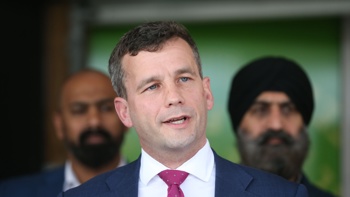The Government won’t impose mandatory Covid-19 tests on travellers from China - despite the virus running rampant in the country - as there is “minimal public health risk to New Zealand”, Covid-19 Response Minister Ayesha Verrall said.
The Government will, however, implement a random testing regime in coming weeks - with participation voluntary - and will also consider testing wastewater on incoming flights, she said.
In a statement, Verrall reiterated the Government’s advice to all international travellers to do a Covid test “if they become symptomatic after arrival in New Zealand”, adding it was also stepping up awareness of free RATs available at airports.
”This follows growing global concerns, including from the World Health Organisation (WHO) about lack of reliable data on case numbers in China and their work to address this,” Verrall said.
”In response, officials have done a public health risk assessment including working through scenarios of potential case numbers among travellers from China. This confirmed these visitors won’t contribute significantly to our Covid case numbers, meaning entry restrictions aren’t required or justified.
“There is minimal public health risk to New Zealand. We know that BF7 is the prevalent variant in China and that it hasn’t caused significant outbreaks in other countries that, like New Zealand, have already been exposed to the BA5 variant. So public health measures are not required to protect New Zealanders.
“However, we do share the WHO’s concerns about lack of information sharing and this is why we will be asking travellers arriving from China to help us gather more information. In coming weeks we will temporarily be emailing a random sample of people recently arrived from China to ask them to undertake a RAT test and share that information with health authorities. It’s entirely voluntary and we have had high uptake from international visitors when we used this method before.”
Verrall added it was important to note that new Covid variants can arise from across the world, not just China.
“[This is] why we’re reminding arrivals from all countries to take the free RATs at the airport and test if they develop symptoms once in New Zealand.
”In coming weeks, ESR scientists will also pilot testing of wastewater from international flights and assess the feasibility of this method replacing the targeted and temporary voluntary testing that we’ve announced today for travellers from China.
- Mandatory Covid-19 testing for China travellers overreaction, NZ officials reported saying
- Beijing threatens response to ‘unacceptable’ virus measures
- Covid testing travellers from China a "controversial" move in Canada
”To conclude, being up-to-date with Covid-19 vaccination – including with your booster vaccination, continues to be your best protection against hospitalisation and severe disease. The current vaccines remain effective at reducing risk of severe disease if you are infected with any of the variants currently circulating.
”New Zealand continues to welcome visitors and tourists, and we ask that everyone follows the current public health measures which include staying home if you are unwell and isolating if you test positive for Covid-19.”
In a press conference directly after the statement was released, Verrall said scientists have been studying ways to test wastewater from flights despite the chemicals used in aeroplane toilets “and they cracked it ... just before Christmas”.
“Now we need to see if that’s operationally feasible on the ground.”
She expressed optimism that voluntary testing will help combat the “information gap” coming from China.
“What we want to see is more information being shared,” she said.
“The key thing here is that we know this isn’t an emergency setting anymore. We have gone through a considered process - making sure that we have looked at the variants, done these projections - and I think we’ve come up with a good balance.”
The measures will likely be reassessed in about a month, with the possibility that random, voluntary testing will give way entirely to less burdensome wastewater testing, she said.
The announcement comes after the Government said earlier this week that a risk assessment was underway and that it would be completed within 24 hours.
“Our response will remain proportionate to the potential risks posed by travellers and in the context of the international situation,” duty minister Stuart Nash said on Monday.
Earlier, leading epidemiologist Michael Baker said it was likely travellers from China would face new requirements.
Baker told Radio NZ, however, that any policy changes made for people coming into New Zealand from countries with high Covid cases should be carefully worded.
He acknowledged that such rule changes should apply not only to China, but any country where case numbers were surging - or where there was not enough information to know the situation and the proportion of the population with the virus.
“It will be important that the policy is framed in a way that it has thresholds,” he told the station.
Verrall said today that pre-departure testing isn’t necessary at this point for any country, including China.
“On the basis of the assessment that we’ve done, we don’t see a justification for singling any one country out,” she said.
Several countries have already reintroduced travel restrictions on anyone entering their borders from China; including Australia, whose government made a similar announcement yesterday.
Australian health minister Mark Butler said the decision was made amid the absence of comprehensive information about the Covid situation in China.
The country has seen a surge in cases and spread after abandoning its strict zero-Covid policy early last month - allowing more freedom to residents and choosing to live with the virus, as much of the world is doing already.
Images out of China the last few weeks have shown harrowing scenes; with hospitals filled with ill patients and reports of funeral parlours under strain.
“Out of an abundance of caution, travellers from China will need to provide a negative test before their flight,” Butler said.
“The World Health Organisation has described such measures as understandable.”
The new rule is effective from Thursday.
Butler said Australia shared the concerns shared by various governments and particularly those expressed by WHO.
Butler said the advice they were given was that the dominant strain in China at the moment is the Omicron subvariant BF.7 - the same subvariant that has already been in Australia for several months.
Take your Radio, Podcasts and Music with you









